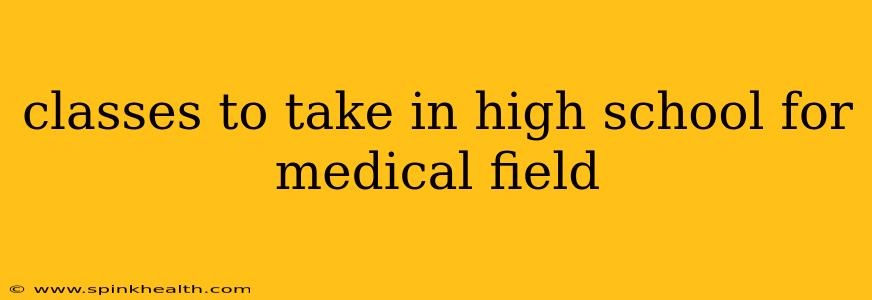Charting Your Course: The Essential High School Classes for a Medical Career
The dream of a career in medicine often sparks early, a vision fueled by a desire to heal, to help, to make a difference. But the path to becoming a doctor, nurse, or other medical professional is paved with preparation, starting long before college applications. Choosing the right high school classes is the crucial first step in this journey. This isn't just about getting good grades; it's about building a solid foundation of knowledge and skills.
My own journey began with a fascination with the human body, a curiosity that led me down the path of pre-med. I remember the excitement of dissecting a frog in biology class, the challenge of organic chemistry, and the satisfaction of mastering complex medical terminology. These experiences shaped my path, and I want to help you chart yours.
The Core Curriculum: Building Blocks for Success
Before we dive into the specialized courses, let's address the fundamentals. A strong foundation in the core subjects is absolutely essential. We're talking about:
-
Strong Math Skills: Medical fields rely heavily on mathematics, particularly for data analysis, dosage calculations, and understanding complex research. Aim for advanced math courses like pre-calculus, calculus, and statistics, depending on your school's offerings.
-
Science is King: Biology, chemistry, and physics are non-negotiable. Aim for the most advanced levels your high school offers. Laboratory work is invaluable, as it provides hands-on experience with scientific methodologies.
-
English and Communication Prowess: Effective communication is vital in medicine, whether you're explaining a diagnosis to a patient or presenting research findings to colleagues. Strong English skills, including writing and public speaking, are crucial.
Specialized Courses: Diving Deeper into the Medical World
Beyond the core curriculum, certain specialized courses can significantly boost your application and prepare you for the rigors of medical school or other related programs.
-
Anatomy and Physiology: Understanding the human body is fundamental. This course provides a detailed exploration of the structure and function of various body systems.
-
Advanced Biology (e.g., AP Biology, IB Biology): A deeper dive into biological concepts, including genetics, cellular biology, and ecology, will be highly beneficial.
-
Chemistry (General, Organic, and possibly AP Chemistry): A strong grasp of chemistry is essential for understanding the processes within the human body and the effects of medications.
-
Psychology: Understanding human behavior and mental health is increasingly important in medicine, leading to a more holistic and patient-centered approach.
What About Other Relevant Classes?
Beyond the core sciences, consider these additions to strengthen your profile:
-
Computer Science: Medical technology is rapidly advancing, and basic programming skills can be advantageous.
-
Health Occupations/Medical Terminology: Some high schools offer introductory courses to the medical field, providing exposure to various medical careers and terminology.
-
Advanced Placement (AP) and International Baccalaureate (IB) Courses: These rigorous courses demonstrate a strong academic commitment and can earn you college credit.
H2: How important are extracurricular activities?
Extracurricular activities are crucial! Colleges and medical schools look for well-rounded applicants. Volunteering at a hospital, working as a medical assistant, or joining a science club demonstrates your genuine interest in the field and provides valuable experience.
H2: What if my high school doesn't offer all these courses?
If your high school has limited course offerings, explore online learning platforms like Coursera or edX. These platforms provide access to a wide range of college-level courses, allowing you to supplement your high school education.
H2: When should I start thinking about these courses?
The sooner, the better! Plan your course schedule with your guidance counselor, carefully selecting courses that align with your career goals and your academic strengths.
My own experience taught me that passion and preparation go hand-in-hand. Choosing the right classes is just the beginning. The journey to a medical career requires dedication, perseverance, and a genuine desire to make a positive impact on the lives of others. Remember to explore your interests, embrace the challenges, and never lose sight of your dream.

